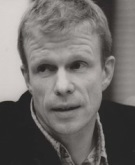 Andreas Tretner
Andreas Tretner
Foto © Renate von Mangoldt, Literarisches Colloquium Berlin.
Andreas Tretner was born in 1959 in Gera in the former German Democratic Republic (GDR). After he completed his degree in Translation Studies he worked as a technical translator, as a lector for Slavic literatures at Reclam publishing house in Leipzig and since 1991 he works as a freelance translator. Each and every one of these biographical stations was important for his career path: during his interpretation and translation studies he took the initiative and met up with like-minded people to translate literary texts, while working as a technical translator he described technical processes and as a lector he developed an analytic-receptive perspective of the text, so as to be able to distinguish between different criteria for determining the quality of a translation. He translates from Russian, Bulgarian and Czech whereby Russian predominates in comparison. He translated „Bassaxofon“ [The Bass Saxophone] by Josef Škvorecký from the Czech language into German, a book that to this day remains very important to him. Together with the saxophone player Almut Schlichting he performs a type of score he created from the text, during which he feels the degree to which language is rhythm. The visibility of the translator in the field of literature he considers to be on the right track. At the same time however he reminds of the delicate role the translator plays in the relationship between author and reader and refers to his colleague Jürg Laederrach who wanted to be very close to his idol, the author, and considers the visible intervention by the translator to be disruptive. Since the translator is however unable to dissolve his subjectivity, Tretner compares the translator with a interpreter who interprets, re-enacts and ultimately performs the „composition“ by the author („the translation would accordingly be a performance“). The translator thus has a signature that nonetheless has to be flexible and adequate. What is constitutive for Tretner: „As clear as the original text meets its reader, as clear the translation should approach the German reader.“ The work involved in generating a language unique to the author until a recognizable sound is created is for him an unavoidable cycle which begins with great effort. The fun always sets in over time. Tretner considers the German book market to be in a sensitive and uncertain situation, which also has an effect on the publication of East European literatures. He however is very optimistic about the activities for instance by the Robert Bosch Foundation. His recommendation for young, soon-to-be translators is the intensive, emphatic reading of books, especially in their own language. It is very important to analyse what for instance defines style and to become aware of the variety contained in the German language.
Relying on the structure and methodology of classical and postclassical [...]
For further information on translation, the TransStar project and the [...]
Relying on the structure and methodology of classical and postclassical [...]
Sir or Madam, In co-operation with KulturKontakt Austria, the Austrian [...]
Five short films with translations (videopoetry) were made as part [...]
Translating Cube: Six Sides of European Literature and Translation Berlin, [...]
Programme (PDF)
Five short films with translations (videopoetry) were made as part [...]
Translating Cube: Six Sides of European Literature and Translation Berlin, [...]
Programme (PDF)
Translating Cube in Tübingen Reinold Hermanns: SWR2 Journal am Mittag, [...]
Being Exchanged: Between Paris, Stuttgart and Ivano-Frankivsk Yuri Andrukhovytsh, Lubomír [...]
Five short films with translations (videopoetry) were made as part [...]
Bookstore: http://www.edition-fototapeta.eu/geschichten-erzaehlen
More here (PDF). Bookstore: https://knjigarna.ff.uni-lj.si/si/izdelek/1623/pet-poti-do-prevoda/
Five short films with translations (videopoetry) were made as part [...]
Bookstore: http://www.edition-fototapeta.eu/geschichten-erzaehlen
More here (PDF). Bookstore: https://knjigarna.ff.uni-lj.si/si/izdelek/1623/pet-poti-do-prevoda/
Translating Cube: Six Sides of European Literature and Translation Berlin, [...]
Programme (PDF)


